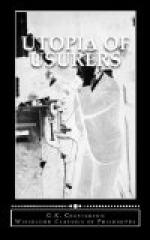THE FRENCH REVOLUTION AND THE IRISH
It will be long before the poison of the Party System is worked out of the body politic. Some of its most indirect effects are the most dangerous. One that is very dangerous just now is this: that for most Englishmen the Party System falsifies history, and especially the history of revolutions. It falsifies history because it simplifies history. It paints everything either Blue or Buff in the style of its own silly circus politics: while a real revolution has as many colours as the sunrise—or the end of the world. And if we do not get rid of this error we shall make very bad blunders about the real revolution which seems to grow more and more probable, especially among the Irish. And any human familiarity with history will teach a man this first of all: that Party practically does not exist in a real revolution. It is a game for quiet times.
If you take a boy who has been to one of those big private schools which are falsely called the Public Schools, and another boy who has been to one of those large public schools which are falsely called the Board Schools, you will find some differences between the two, chiefly a difference in the management of the voice. But you will find they are both English in a special way, and that their education has been essentially the same. They are ignorant on the same subjects. They have never heard of the same plain facts. They have been taught the wrong answer to the same confusing question. There is one fundamental element in the attitude of the Eton master talking about “playing the game,” and the elementary teacher training gutter-snipes to sing, “What is the Meaning of Empire Day?” And the name of that element is “unhistoric.” It knows nothing really about England, still less about Ireland or France, and, least of all, of course, about anything like the French Revolution.
Revolution by Snap Division
Now what general notion does the ordinary English boy, thus taught to utter one ignorance in one of two accents, get and keep through life about the French Revolution? It is the notion of the English House of Commons with an enormous Radical majority on one side of the table and a small Tory minority on the other; the majority voting solid for a Republic, the minority voting solid for a Monarchy; two teams tramping through two lobbies with no difference between their




